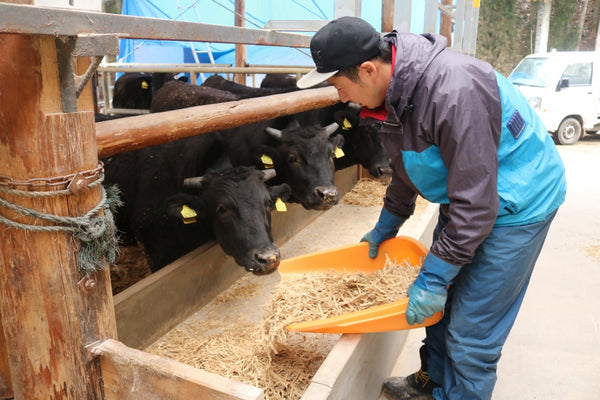Last week, we explained what Wagyu cattle is and explained about the different breeds. This week will be about why wagyu beef is different from other beef.
Well-marbled Japanese wagyu is called Shimo-furi which means 'beautiful frosted beef'. After grilling, the wagyu’s flavour and sweet rich aroma comes from the white bands of fat which runs through it. The smell and taste are called wagyu-kou in Japanese. It tastes mild and natural and releases a scrumptious aroma. Also, the fat will melt in your mouth which gives it a soft texture from the first bite like no other beef you've had before.
Japanese Black is known for having a higher proportion of fatty content than other meat. This quantity of fat is one factor responsible for the delicious flavour. The mono-unsaturated to saturated fat ratio is far higher in Wagyu than in other beef, and it's these fats disintegrating during cooking which provides Waygu with its signature rich and powerful flavour.
How does that fat taste? It’s difficult to describe precisely, but incredibly rich. Some tasters would no doubt be turned off by the slickness or oily nature—as the fat melts, it gives almost an olive or coconut oil texture and flavour, along with intense beefiness.
Wagyu cattle are spoiled by their farmers. They have specific lifestyles and diets which the farmers will oversee every day. Through the meticulousness of the farmers, they will fatten up the cattle during their life to achieve the perfect level of marbling. Gifu prefecture is the region that has been breeding wagyu for longer than any other prefecture in Japan. Gifu Prefecture's level of expertise in fattening techniques also stand out by generating significantly more meat than the national average that is certified grade 5, the highest carcass rating of the Japan Meat Grading Association.
Many wagyu farms assign names to each head of cattle and raise them like members of a family. Calves are transitioned from breast milk shortly after birth and onto artificial milk. Each one is fed milk by hand, and they are given warm jackets in the cold season. This affection helps the calves grow healthy and stress-free.
Slaughtered at three years old (eighteen months longer than traditional techniques), the extended lifespan of the Wagyu herd makes the production process an expensive one, to say the least. A five-star upkeep and diet combined with the increased lifespan of the Wagyu cow mean this premium herd are an expensive house guest.



